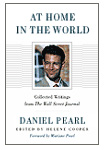|
The world has come to know Daniel Pearl as the Wall Street Journal reporter who was kidnapped and murdered by terrorists in Pakistan in early 2002, just four months after 9/11. People around the world, along with his pregnant wife and family, prayed for his release. Since then, he has been remembered as a symbol of hope: a man who built bridges between diverse cultures -- as a writer and a gifted musician.
Danny was born on October 10, 1963, in Princeton, New Jersey, and grew up in Los Angeles, where he displayed an insatiable curiosity for music, academics and sports.
Music turned out to be an essential form of expression for Danny and led him to become a fixture in several bands throughout the world, where he improvised on the electric violin, fiddle, or mandolin. Today, friends and colleagues still recall how quickly he would pick up an instrument when he sensed an occasion, such as writing a song for a pregnant friend past her due date, or the Christmas night when he entertained downhearted co-workers at his office.
Danny exuded compassion and joy wherever he went. As his best friend said, "Danny was the only one who didn't know he was charismatic." He endeared himself to others with an easy humor and appreciation for the absurd, always keeping an open mind to other perspectives, cultures, and backgrounds. He was humble, generous and loved life and people. World leaders and peasants, Rabbis and Mullahs, all considered him a friend.
A gifted writer from a very young age, Danny's aptitude for journalism became apparent as a student at Stanford University where he co-founded the student newspaper Stanford Commentary. He graduated in 1985 with Phi Beta Kappa honors and then spent a summer as a Pulliam Fellow intern at the Indianapolis Star before joining the North Adams Transcript and the Berkshire Eagle. After a few years, he moved on to the San Francisco Business Times and within few weeks he joined the Wall Street Journal in 1990. Danny started in the Journal's Atlanta bureau and moved successively to the Washington and London bureaus, serving as a Middle East correspondent. After he met Mariane in 1998, he moved to Paris where they were married a year later.
In October of 2000, they moved to Bombay, where Danny became the South Asia Bureau Chief for the Wall Street Journal. Danny's skill as a foreign correspondent was apparent not only in his entertaining Page One "A-hed" pieces which shed light on other cultures, but also in investigative stories that uncovered the truth from the rubble of war and devastation. It was Danny who uncovered that the U.S. had mistakenly bombed a Sudanese pharmaceutical plant, believing it to be a weapons factory. Later, he broke the story of Al Qaeda's money laundering through the Tanzanite gem market.
It was from Bombay that Danny covered the "war on terrorism," occasionally venturing into Pakistan. He was retracing the steps of "shoe bomber" Richard Reid and hoped to meet with Sheik Gilani, a spiritual leader, when he was abducted in Karachi on January 23, 2002. For weeks, millions around the world -- from heads of state, to religious leaders and ordinary people -- rallied for Danny's release. In Danny, the terrorists believed they abducted a media figure, an American, and a Jew. But they had much more -- a true citizen of the world and an embodiment of civilized values, whose death, like his life, would inspire millions of people in the cause of decency and cultural understanding. Several weeks elapsed without word of his fate; his murder was confirmed on February 21, 2002. Four of the kidnappers were convicted on July 15, 2002, including mastermind Omar Saeed Sheik, although others believed to be involved are still at large.
Two days before his abduction, Danny learned that his wife Mariane was expecting a baby boy; he chose the name Adam for their son. In May, just three months after his murder, Mariane Pearl gave birth to Adam.
Following his murder, Danny's family and friends established the Daniel Pearl Foundation to carry on his legacy, using music and words to address the root causes of the hatred that took his life. The book "At Home in the World" published in June 2002, features 50 of Danny's best articles, illustrating his curiosity, humor, fairness and his love of humanity.
Danny's spirit lives on in the hearts of those who knew him, and in the lives of the thousands of people who have been inspired and touched by him.
 "
At
Home in the World " features fifty of the best stories
Danny wrote during his fifteen years as a domestic and
international journalist. They illustrate his humor,
curiousity, objectivity, fairness and love of humanity.
The book is available at Amazon.com
. "
At
Home in the World " features fifty of the best stories
Danny wrote during his fifteen years as a domestic and
international journalist. They illustrate his humor,
curiousity, objectivity, fairness and love of humanity.
The book is available at Amazon.com
.
Read
some of Danny's Wall Street Journal stories online.
Read
tributes and other information about Daniel Pearl thanks
to the South Asian Journalists Association |
